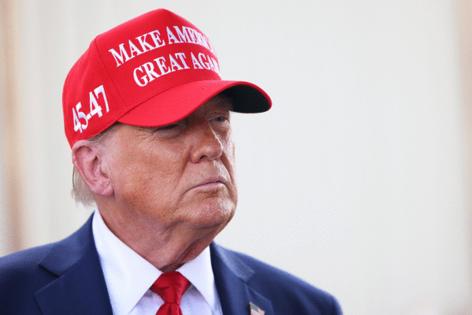David Mills: Democracy requires understanding how someone can vote for Trump
Published in Op Eds
It was a simple social media post, critical of one of Donald Trump's supporters, who justified his support with a bizarre misreading of the man and his motivations. But to be fair to the people on that side, I had to say that with our binary system, I could understand how someone could reasonably believe that he was a better choice than the alternative.
You can imagine the reaction. Trump was evil and his supporters were evil. Had I said the same thing about Kamala Harris' supporters with a different set of readers, the reaction would have been the same. That's America now.
Polarized and hateful
We are at the point in the election cycle when commenters start worrying about polarization, and readers who've been gorging for months on all the attack articles and ads start worrying that Americans have become too divided.
I admire the instinct, but I think the hand-wringers miss the point. They think of the polarized voters as like kids fighting on the playground over a ball and they answer with "play nice."
I think the polarized voters are like my children at certain points when they were little. They were not going to play nice. Parents should know that you can't change a child's willfulness and selfishness by just telling them to do better.
The only answer is to try to form them over time and to hope that experience will teach them that playing nice works better than playing mean. (Mine eventually learned that, and turned into lovely people, but Trump remained the schoolyard bully.) That's the way democracies develop, by people learning to cooperate even when they don't want to.
Elections in which voters have only two real choices polarize voters. The campaigns will try to make everyone feel they're making a life-or-death decision, and people do get to feel that way, but in the past they tended to get over it.
But the mutual contempt now seems worse than ever, and now seems permanent, a feeling people aren't going to lose. For one thing, it makes us feel good. Polarized people can be very happy with themselves, because what better sign of righteousness can there be than hating the devil?
The trapped Trump voter
Let's go back to the kind of Trump voters I described. Let's stipulate, as the lawyers say, that many Trump voters are idiots and knaves. But let's also stipulate that many are good people who are doing the best they can to do the right thing. (Both of which are true of Harris voters as well.) Let's look at them as old-fashioned humanists do and not modern political partisans.
What does someone do who is broadly in agreement with Trump's policies, very much against Harris', doesn't believe Trump to be a true danger to democracy but does think that Harris is a danger to institutions and beliefs he values a lot? What does he do if he fully recognizes Trump's defects and corruption and still thinks he'll be better for America than Harris?
How, if he's going to act with integrity, can he do otherwise than vote for Trump? You, in the same circumstances, would do the same.
The quandary he faces is like having to choose between the surgeon who flunked out of med school and the one who barely graduated and already has sky-high malpractice premiums. If you need the surgery, you've got to choose. You choose the one who actually graduated and hope for the best. That's all you can do. You make the least bad decision, knowing it could kill you.
But, and this is part of democracy as well, your decision isn't final. It's made in a context, in a system. What you hope for is that the rest of the medical system will protect you.
You assume that other doctors are watching your surgeon, that the doctors and nurses in the post-op ward will look out for anything going wrong, and everyone else will make sure you recover — that all the long-established procedures protect you from the worst consequences of the bad decision you had to make.
To put it another way, most people learn to cooperate the way children do, and that includes standing up to the bullies. Americans together can do that, if we want. If we'll extend the respect democracy requires even to people we think make a huge mistake.
Saving democracy
I know that many people, including Harris herself, like to claim that a President Trump will destroy American democracy. I think that's a little hysterical — a self-serving and perhaps calculated hysteria — showing an astonishing lack of faith in their fellow Americans.
It's a very big, very complex country, and very hard to subvert. As Trump found out. And are Democratic politicians so pathetic they can't stand up to the president?
In any case, democracy depends upon a kind of old-fashioned humanism. It isn't easy. It takes some imagination to see how other people see the world, and some faith to hold the working assumption that they're responsible and serious. It's the orientation that modern democracies depend upon, trusting the truth will eventually win out.
It's not something one would bet on, but it's worked so far, and as Churchill famously said, it beats the alternatives.
_____
(c)2024 the Pittsburgh Post-Gazette Distributed by Tribune Content Agency, LLC.




























































Comments